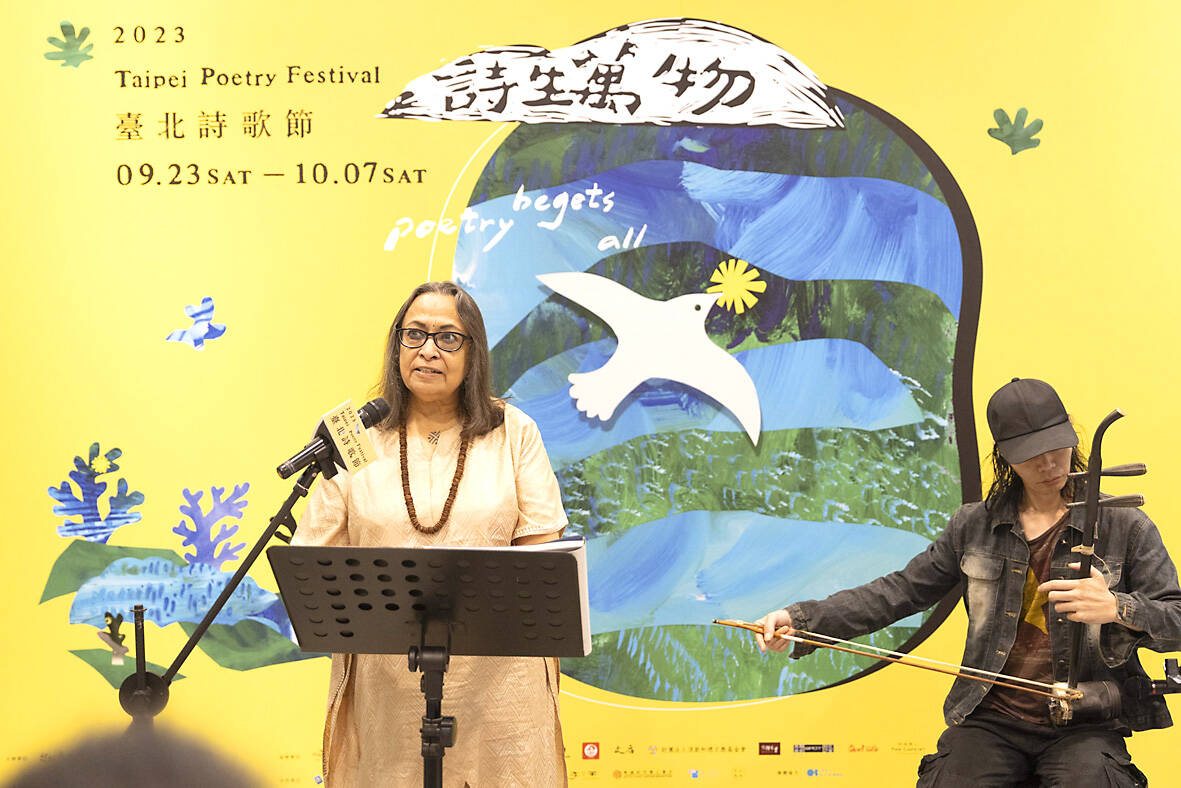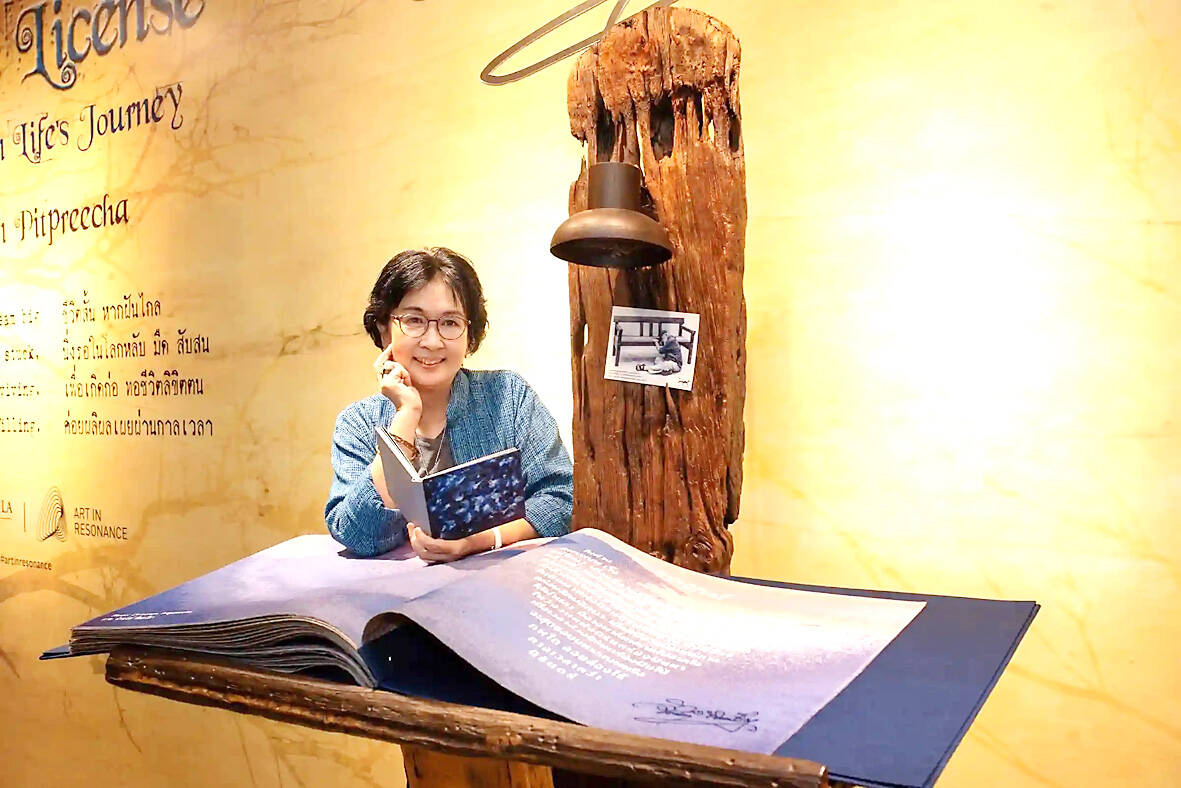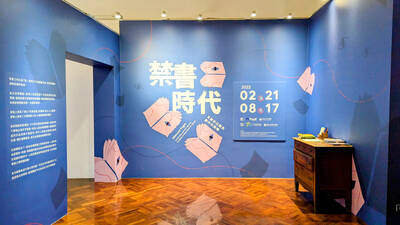After three years, the Taipei Poetry Festival (臺北詩歌節) is once more able to invite resident poets from abroad to spend time and create in Taiwan’s capital. Mumbai-based Bina, who will spend 17 days here, is also a designer and founded in 1997 the award-winning International Gallerie, an arts and ideas magazine.
This year’s festival theme is “Poetry Begets All” (詩生萬物), referring to the power of poetry to condense reality in a “magical leap.” Held from tomorrow to Oct. 7 in numerous cultural spaces across the city, events include performances, concerts, film screenings, book exhibitions, talks and activities. Poets will also be visiting schools and creating works with students.
Bina will speak at two events during the festival: “A Brief History of Women and Poetry” on Sunday with Taiwan-based Malaysian poet Maniniwei, and the Sept. 30 screening of Huang Ming-chuan’s (黃明川) Deepest Uprising (波濤最深處, reviewed Sept. 16, 2021), which features 16 Asian female poets. In addition to being one of the subjects, Bina was also a consultant for the documentary.

Photo courtesy of Taipei City Government
She will also take part in tomorrow’s opening show A Centennial Dialogue: The Fire and the Light at the Beginning of the Century (百年對話:世紀初的火與光), which connects Taiwanese poets from the turn of the 20th century to present day through the guidance of literature scholar Liao Chen-fu (廖振富) and poet Yang Chia-hsien (楊佳嫻). Musical acts Taugether (鬥鬧熱走唱隊) and Lo Si-rong (羅思容) will be interpreting both historic and modern Taiwanese poetry through ancient and contemporary tunes. Admission is free but tickets must be obtained in advance through kktix.com.
Other foreign guests include Chiranan Pitpreecha from Thailand, Maiko Sugimoto from Japan, Aurelia Lassaque from France and Chow Hon Fai from Hong Kong, who will be conversing with local creatives throughout the week.
■ Tomorrow to Oct. 7 at numerous locations in Taipei

Photo courtesy of Taipei City Government
■ On the net: poetryfestival.taipei/2023 for details

From censoring “poisonous books” to banning “poisonous languages,” the Chinese Nationalist Party (KMT) tried hard to stamp out anything that might conflict with its agenda during its almost 40 years of martial law. To mark 228 Peace Memorial Day, which commemorates the anti-government uprising in 1947, which was violently suppressed, I visited two exhibitions detailing censorship in Taiwan: “Silenced Pages” (禁書時代) at the National 228 Memorial Museum and “Mandarin Monopoly?!” (請說國語) at the National Human Rights Museum. In both cases, the authorities framed their targets as “evils that would threaten social mores, national stability and their anti-communist cause, justifying their actions

Taiwanese chip-making giant Taiwan Semiconductor Manufacturing Co (TSMC) plans to invest a whopping US$100 billion in the US, after US President Donald Trump threatened to slap tariffs on overseas-made chips. TSMC is the world’s biggest maker of the critical technology that has become the lifeblood of the global economy. This week’s announcement takes the total amount TSMC has pledged to invest in the US to US$165 billion, which the company says is the “largest single foreign direct investment in US history.” It follows Trump’s accusations that Taiwan stole the US chip industry and his threats to impose tariffs of up to 100 percent

In the run-up to World War II, Admiral Wilhelm Canaris, head of Abwehr, Nazi Germany’s military intelligence service, began to fear that Hitler would launch a war Germany could not win. Deeply disappointed by the sell-out of the Munich Agreement in 1938, Canaris conducted several clandestine operations that were aimed at getting the UK to wake up, invest in defense and actively support the nations Hitler planned to invade. For example, the “Dutch war scare” of January 1939 saw fake intelligence leaked to the British that suggested that Germany was planning to invade the Netherlands in February and acquire airfields

The launch of DeepSeek-R1 AI by Hangzhou-based High-Flyer and subsequent impact reveals a lot about the state of the People’s Republic of China (PRC) today, both good and bad. It touches on the state of Chinese technology, innovation, intellectual property theft, sanctions busting smuggling, propaganda, geopolitics and as with everything in China, the power politics of the Chinese Communist Party (CCP). PLEASING XI JINPING DeepSeek’s creation is almost certainly no accident. In 2015 CCP Secretary General Xi Jinping (習近平) launched his Made in China 2025 program intended to move China away from low-end manufacturing into an innovative technological powerhouse, with Artificial Intelligence